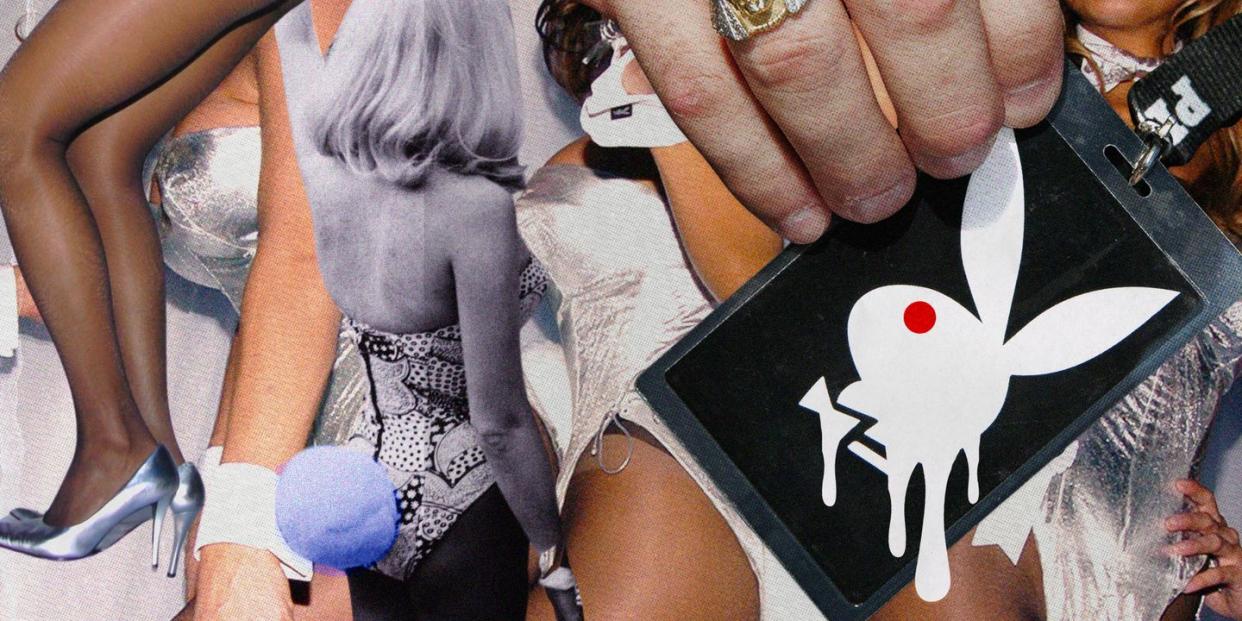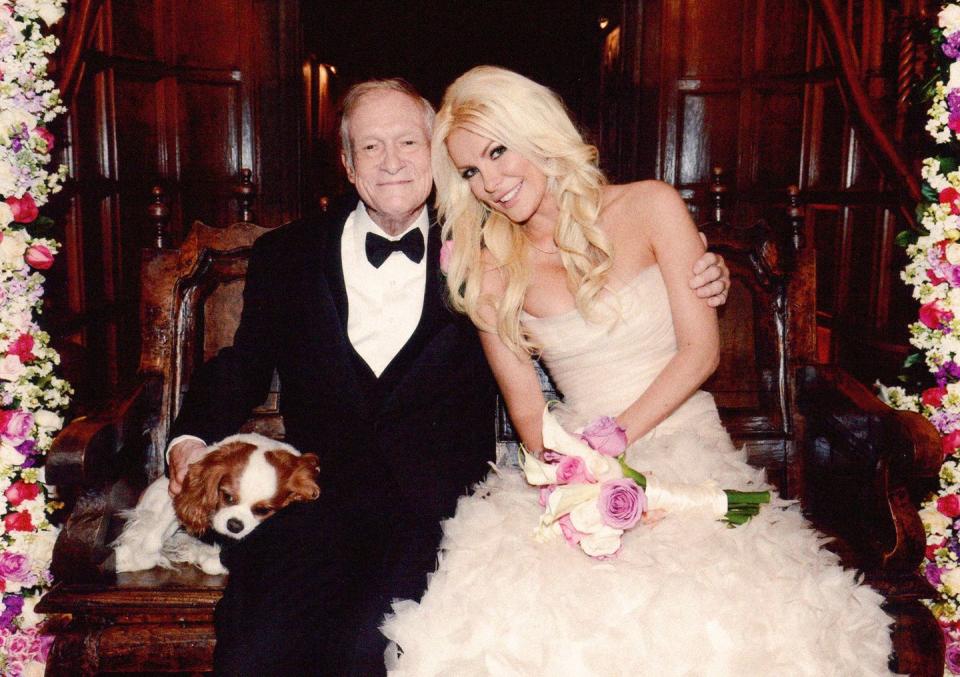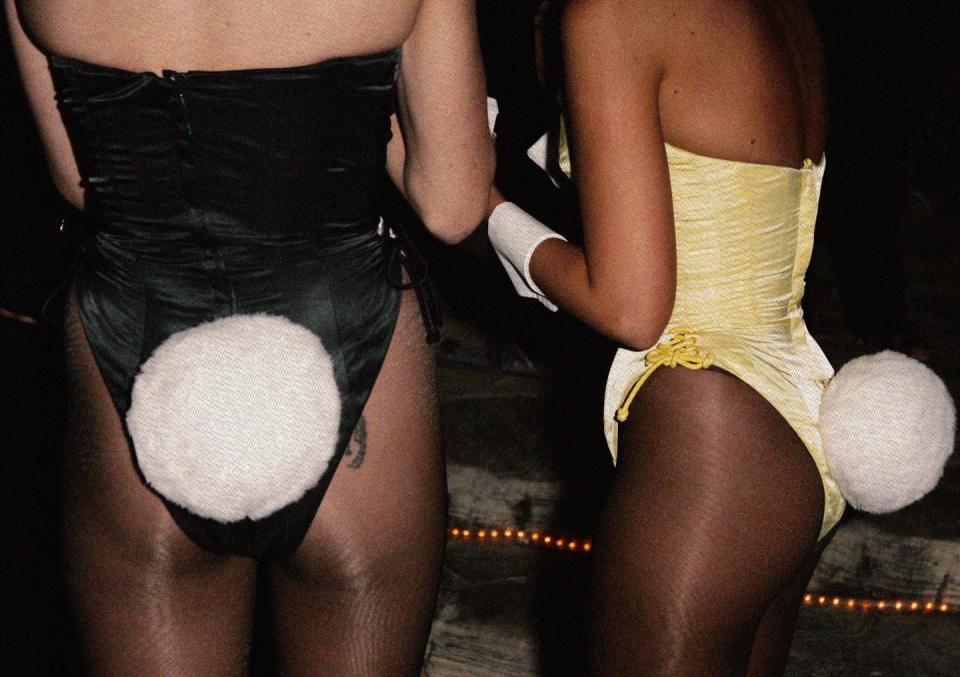The Dark Side of Playboy: Crystal Hefner opens up about surviving the mansion

Legacy was an important word to Hugh Hefner, the editor and self-styled cad who launched Playboy magazine in 1953 – the first issue of which featured nudes of Marilyn Monroe published without her consent. More than seventy years on, while the brand’s allure (and revenue) has faded, it remains associated with sex, power and youth – and it’s also marred by an additional air of toxicity.
Many former ‘girlfriends’ of Hefner (often referred to by the nickname ‘Hef’) have spoken out against life inside the world’s most famous mansion and its impact on their mental state (including Holly Madison in her 2015 memoir Inside the Rabbit Hole). They have levied accusations of controlling behaviour at the late entrepreneur, who died in 2017 at the age of 91. Others still speak highly of him and praise Playboy for sky-rocketing their careers. After all, during its golden era, posing for Playboy could change the entire course of a woman’s life. The key divide between reactions to questions around him seem to be whether they come from one of his many live-in girlfriends or models who solely posed for the magazine, the latter apparently getting away lightly.
Now, Hefner’s third and final wife, Crystal Hefner (nee Harris), 37, is ready to talk – and tells Cosmopolitan UK she’s spent the last seven years unpicking her decade-long relationship with a man whose name “was synonymous with luxury, glamour and sexual freedom”. The man who dictated which women were ‘sexy enough’ to be consumed by other men around the world. It hasn’t been easy.

In her new book, Only Say Good Things (the ever image conscious Hef’s mantra), Crystal depicts what many would describe as an abusive relationship, from financial control to dictating her wardrobe and behaviours. It’s a label she isn’t entirely comfortable using, instead preferring to define it as a relationship with a “huge power imbalance… that was emotionally abusive at times. I was dealing with somebody with a narcissistic personality disorder.” But, she insists, “Hef loved me the best way he knew how.”
Only Say Good Things charts Crystal’s life, from her birthplace in Arizona to a childhood that saw her “bounce from place to place” – including living above a pub in Birmingham for a brief stint – as her British parents, hellbent on chasing the American dream, did all they could to support her father’s singing career (he once opened for Sammy Davis Jr and Johnny Cash, but largely played in local bars). After her father passed away when she was just 12, while the family were living in California, her mother’s new partners and various other ‘homes’ rotated in and out of the picture. It's an upbringing that goes some way to explaining why a young woman might find comfort in an older man offering the illusion of stability and home for seemingly little in return. Of course, as we are now beginning to realise, the reality was quite the opposite – and the price Crystal paid was far higher than she bargained for.
Crystal confesses that making sense of both her upbringing and time inside the world’s greatest PR machine has taken years. And lots of therapy. The world, following the MeToo movement, has been evolving in tandem too. Now, much of what Crystal has to say about Playboy and Hef are not ‘good things’ – but her feelings still aren’t clear-cut.
If we’re to believe the origin story Hefner liked to tell interviewers, Playboy was borne from his own heartbreak. He was, apparently, inspired to launch the organisation after his wife Mildred had an affair whilst he was away with the military during World War II. Despite still going on to marry Mildred, Hefner never got over her betrayal and soon diverted away from the idea of 2.4 children and a white picket fence, in favour of setting up a publication and (penthouse) for ‘bunnies’, famous faces and anyone else he deemed worthy of admittance.
And while today the very idea might sound elitist, objectifying and problematic, for those who were teenagers in noughties Britain at the same time Crystal was, the influence of Playboy cannot be overstated. Celebrities clamoured to attend the infamous mansion parties. Teenagers wore Playboy jewellery to school and proudly displayed bunnyhead pencil cases on their desks without it raising an eyebrow. Social media was still in its infancy, sources from which we drew our world views were limited and female power and sexuality was presented as buxom-yet-thin, adult-yet-girlish. Crystal herself grew up sneaking glances at her stepfather’s Playboy magazines, idolising the women on the pages.
Millions of viewers tuned into Girls of the Playboy Mansion (as it was known in the UK - or the Girls Next Door if you were in the US), a seemingly aspirational reality show about the lives of women, like Crystal, who lived with Hef and appeared to be thriving. It aired pre-watershed. She says she initially didn’t receive a fee for taking part in the show, yet Hef took home $200,000 (£157,000) per episode, despite Crystal and the other women making up the majority of screen time.
These women travelled, rubbed shoulders with stars. Sure, we knew they’d made their name by piggybacking off of Hef’s fame, but the trade-off seemed fair. The weekly on-demand orgies that he demanded in exchange, fuelled by weed, Viagra, infection-inducing baby oil (Crystal explains he refused to use lube) and 70s era porn films on loop, were not publicised. The Girls seemed powerful. Happy sat in their powdery pink bedrooms, twizzling Playboy lockets around their fingers. How fooled we were.
A real-life Gatsby
The first time Crystal encountered her future husband was at the mansion’s 2008 Halloween bash, which she attended dressed as a French maid. At the time, she was working low-level modelling gigs (such as handing out T-shirts at sporting events) to scrape rent together – and sent her photo into Playboyafter a fellow model friend encouraged her to, suggesting they could both score a party invite from the team who co-ordinated Hef’s guestlist. They were both approved to enter through the wrought iron gates, yet on the night it was just Crystal who found herself plucked from the crowd by the real-life Gatsby. It was thrilling, she says. Hef’s carefully constructed fantasy world offered an escape from her own.
When Crystal was invited into his bedroom, unaware of his expectations, she initially thought it would be a fun ‘one night’ experience. An anecdote. She ended up staying for a decade. “[To those who say ‘you chose that situation’] yeah, I did. I was young, it was alluring, and I got sucked in. It was a complex mess,” Crystal says calmly. “When I first got to the mansion, I’d never seen carved wood on walls or met someone who owns pyjamas in every single colour. It was Charlie and the Chocolate Factory for adults.
After that weekend, Hef invited Crystal to move in permanently as one of his three ‘girlfriends’ (the other two were then-19-year-old twins Kristina and Karissa Shannon, who’ve since compared their sexual experiences with him to assault). The conversation was quick, and Crystal says she was left to figure out ‘the rules’ by herself, as a catty and competitive atmosphere ran rife between the women. The on-screen girl gang was a myth.
Over time, the fairy tale further unravelled. Crystal describes life in the mansion as “24/7 panic and anxiety,” adding that, “sexually there was no such thing as what I wanted. Hef never learnt how to please a woman, he’d never had to.” She says the women were subject to curfews (she only learnt how to switch her car headlights on after Hef’s death, having never stayed out ‘after dark’). They barely saw their families. Gaining weight or ‘slacking’ on beauty maintenance could see you kicked out, made homeless.
“In the mansion, we didn't have terms like boundaries, narcissism or misogyny. Once [I came to better understand these] things it was like ‘oh that place was riddled with all of that’,” she says. Crystal’s cash flow became entirely dependent on Hef as she stopped all other work and left her apartment at his behest. “He told me what to wear, how to behave. [Somewhat symbolically] the house was riddled with mould,” she says. “But at first it felt like ‘wow, this is some big, beautiful thing that I could be part of’.”

While we’re long past the mentality of asking why women remain in certain situations, Crystal is keen to state for the record that there was a greater pull to Hef than the life of luxury he presented. “I don't know if it's Stockholm Syndrome or what, but at one point I had a few million dollars [saved from my weekly allowance] and I could have left,” Crystal remembers. “But I told my mom ‘I can't, he needs me’. He was getting older. I stayed until the day he died.”
Feeling needed by Hef kept her locked in for years, until in 2011, learning she wouldn’t receive any of the $800,000 (£632,000) her engagement TV special was set to earn broke the dam. Crystal realised she had a choice – and attempted to flee. As her car, paid for by Hef, approached the mansion gates, she heard a voice boom over the intercoms saying she must be ‘detained’. It took a second attempt (pretending she needed to go out to buy tampons) to actually leave. Hef later tweeted “Crystal had a change of heart”. A year later, on New Year’s Eve 2012, they married in a small off-camera ceremony.
Questions about whether it’s enough for Crystal’s choices to be explained by her youth and naivety, or on the popular culture of the time which positioned women as pawns in a male world routinely surface whilst reading the memoir. She points out that the media regularly fired shots at her intelligence, describing herself as “low-hanging fruit… an easy target”. Hefner, meanwhile, was celebrated as the ‘ultimate batchelor’ until his death.
Fuelling the fire
Despite Playboy’s USP being nudity, sex and debauchery, appealing to a youth demographic was always the business strategy and Crystal claims that Playboy HQ was aware of just how young large swathes of its audience was. It made money. “Very young girls would write in all the time, asking how they could get into the magazine. Hef would reply saying ‘Write me again when you're 18,” Crystal recalls. “I remember when we filmed the show and the producers asked me to ‘have more personality’, and I was like ‘what does that even mean?’ as I’d been so stripped of myself. I feel sorry for the young girls watching, who were made to believe it was some fun fantasy. It wasn’t.” Thinking back, Crystal sees those years in the mansion as “a weird moment in time, almost a social experiment.”
These days, she says she feels partly responsible for contributing to the image of womanhood of the era. “I fed into the misogyny without even realising it,” she says, but can she really be held to account when she was so young? It’s something she’s clearly been battling with. “Now, that I'm fully aware of it, I don't want to contribute anymore. It’s still easy for young women to fall into that trap, it’s potential power and attention masked as opportunity. It's dangerous. I hope girls today are being exposed to strong role models, women who know their self-worth.”
And yet, the author has retained the Hefner surname and her position as President of the Hugh M Hefner Foundation. Does she feel conflicted by this? “I think we're still figuring out [what Hef’s legacy should be], he did many positive things in his life.” It’s true that from its inception in 1964, the foundation pushed for civil rights and supported Planned Parenthood. But, Crystal adds, “he also was a narcissist and misogynist. This is true and so is that. It wasn't all good or all evil, but we do have to at least acknowledge the truth.” As for her name, “I am going to drop that name. I don't want that name.”
It's clear that Crystal is still working things out, torn as to how she feels Hef ought to be remembered. She moves between alarming stories of chauvinism and control at the hands of her ex-husband, to empathy. “He was a complex person, and this was all pre-MeToo. Maybe in some ways he didn't know any better, I don't know […] But the thing about Hef though… he never was a predator. If you didn't want to be there, he made it clear ‘there's the door’.”

Crystal says that since having her feminist awakening, she’s trying in her “own little ways [to make amends]”. If a photo of Hef, for example, surrounded by women, is posted via his official social channels, she now insists the women are at least named. She is also pushing for the foundation to donate to more causes supporting women. “I hope I'm helping correct things.” For the first time, she is enjoying her female friendships too, no longer viewing women as ‘competition’.
She’s made other changes, too, more personal ones. “I don't do bleach blonde anymore; I took my breast implants out. With dating, if I don’t feel respected, I don’t want anything to do with it.” Whether the world should leave Playboy in the past or decide to really scrutinise the lifestyle it portrayed and the influence that it’s had on womanhood and pornography since remains to be seen. What is clear is that there’s no going back for Crystal.
“People can take from [my story] what they want, but [I’m okay] if I feel I've got my truth out there.”
Only Say Good Things by Crystal Hefner is out now
Follow Jennifer on Instagram and Twitter
You Might Also Like

 Yahoo News
Yahoo News 
